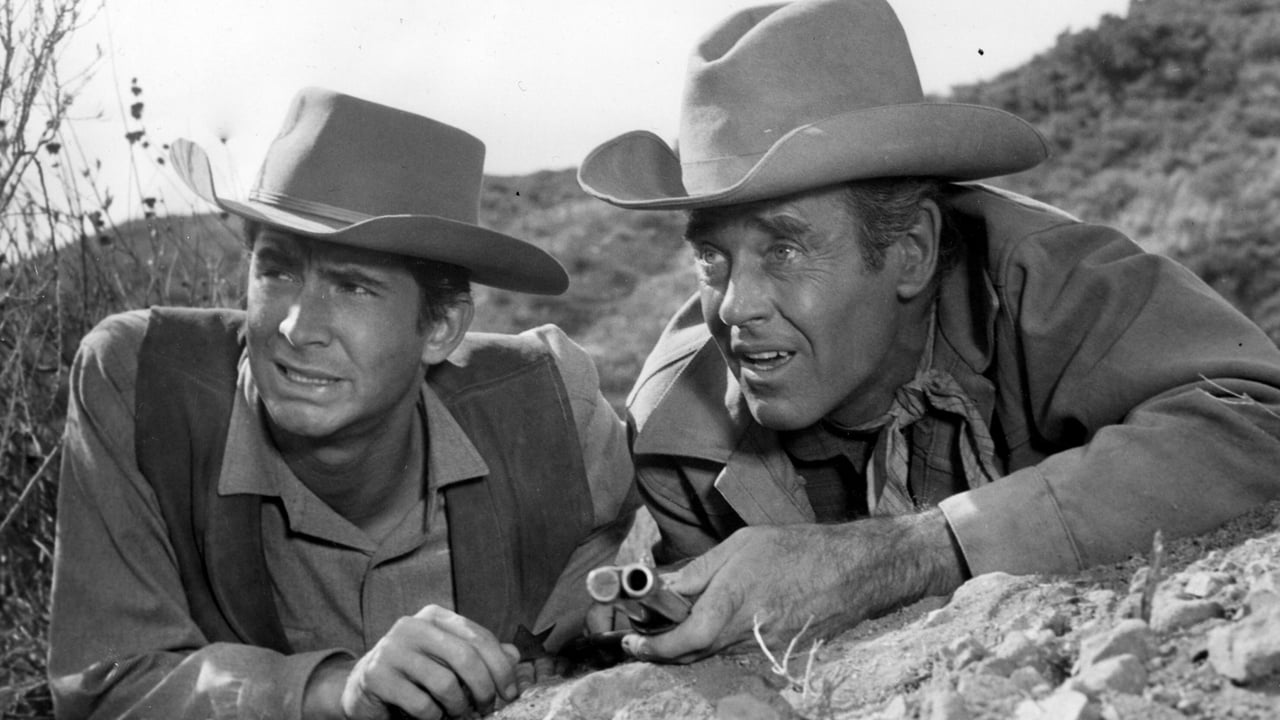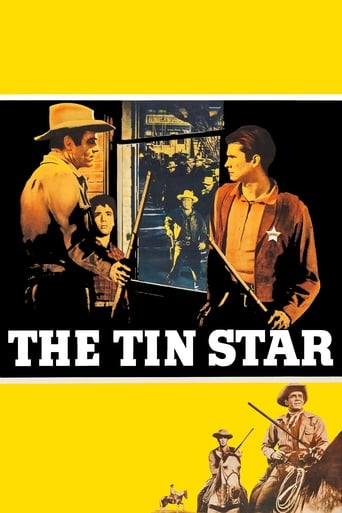



That was an excellent one.
One of the best movies of the year! Incredible from the beginning to the end.
View MoreOne of the film's great tricks is that, for a time, you think it will go down a rabbit hole of unrealistic glorification.
View MoreYes, absolutely, there is fun to be had, as well as many, many things to go boom, all amid an atmospheric urban jungle.
View MoreThis largely unique western deals with coming of age as a young sheriff, the somewhat controversial topic of vigilante justice, and hatred toward Native Americans by many whites on the frontier. We have 3 men or pair of men who are regarded by many in a small western town as murderers. Firstly, there's bounty hunter Morgan Hickman(Henry Fonda),who brings the body of a supposed fugitive into town, expecting a reward. We aren't told the crime committed by the fugitive, but presumably it didn't involve murder of a respected citizen. Most of the town people seemed to consider this murder a crime equal to or exceeding that of the crime committed by the fugitive, even though it was legal. Hence, he was shunned by most of the town people. However, he found an accepting soul in the form of a beautiful and charming widow and her rambunctious half-breed son(Betsy Palmer, as Nona, and Michael Ray as Kip). They tentatively accept Hickman as a roomer, but when he seems upset by Nona's revelation that her murdered husband was a Native American, she's about ready to throw him out. However, he apologizes and calms down her ruffled feathers sufficiently to stay, and eventually form a romantic relationship with her. Like Hickman, Nona and Kim are treated by most regionals as outcasts, she because she consorted with a Native American, and he because he's a half-breed. The second character considered a murderer by some is Bart Bogardus, a bully who runs the livery stable. He shoots down a Native American in the street, claiming self defense, with minimal supporting evidence. Many of the townies are not upset by this murder, as Native Americans were widely regarded as subhuman vermin, to be exterminated. Sheriff Ben, considering him a trigger-happy bully, asks for his gun. But Bogardus resists, pulls his gun on Ben, and Hickman shoots the gun out of his hand. Apparently, Bogardus is not prosecuted for this apparent murder. He heads up a posse going to look for the murderers of Doc McCord. Frustrated that they don't find them at their home, the posse burns their house and other buildings. Miffed that the team of Ben and Hickman capture them alive, Bogardus heads a vigilante group intent on lynching them right away. Ben stands in the way of this mob. Ben talks Bogardus down, but Bordardus tries to shoot Ben on the sly. Ben is a faster draw. The third murderers in the screenplay are the McGaffey brothers, who are charged with the murder of Doc McCord(John McIntire), who treated a bullet wound of one of them, acquired when they held up the stage, killing the driver. After these murders, they decided to hide in a cave in a canyon behind their house. Ben and Hickman serendipitously discover them there. Although Hickman, as an ex-sheriff, has advised Ben to shoot to kill, Ben wants to take them alive, if possible. Hackman helps him toward the goal. But, as mentioned, many townies want to see them hanged as soon as possible, without a trial.. Henry Fonda had witnessed a lynching when young, and found it revolting. Hence, he was keen to do a couple of films talking up the dangers of lynchings. He had been involved in a lynching in the previous movie "The Oxbow Incident", back in 1943. The earlier film "The Silver Whip" has a very similar plot to the present film, involving a thwarted lynching and a young man faced with the challenge of becoming a stage driver, as well as a sheriff's deputy. I regard that film, as well as the present film, as being more interesting and significant than "High Noon" or "The Searchers". The present film is quite possibly Anthony Mann's most significant western.I thought Fonda and McIntire did great jobs in their respective roles. Anthony Perkins' character comes across as too immature to be even a believable temporary sheriff, until toward the end, when Fonda's instructions paid off.Here is a good place to discuss some philosophy relating to vigilantism. From a moral(not necessarily legal) viewpoint, is vigilantism ever justified? If the judicial system is quite corrupt or otherwise ineffective, and you are very positive you have identified the guilty and they have perpetrated a crime of sufficient magnitude, vigilantism may be justified.Distinguishing between self-defense, vigilantism, duels and murder can be difficult. If a person is licensed as a bounty hunter, he is not a vigilante, technically, as long as his job description allows him to kill the fugitive. In the formal duels of the early 19th century, for example, usually one challenged another for a perceived deed or slight. They can be considered a duel between a vigilante(challenger) and one acting in self-defense(the challenged). If there is a mutual agreement to settle a dispute by a formal duel, both may be considered vigilantes.
View MoreNo need to recap the plot. I have to agree with Doug Balch's perceptive review—there're too many flaws in this Mann western to rate with his best. In the pivotal tenderfoot role, Perkins is callow enough but lacks the inner mettle to make his transition to tough guy believable. On the other hand, Fonda's total self-assurance does get tiresome. Jimmy Stewart as Morg, I think, would have conveyed some needed inner life. The movie manages to touch all the expected bases, apart from a racial subtext that reflects America's growing civil rights movement. And as Balch points out, the serial showdown with the McGaffeys is both implausible and poorly staged. Too bad, also, that Paramount couldn't pop for more than an obvious studio town and LA area locations. These familiar settings have cheap TV production written all over them. Perhaps this is why Mann directs in an unusually impersonal manner.On the other hand, Mann manages to soften rough spots with smooth pacing, though I don't spot many of his stylings, especially the reality of violence. I also agree that McIntire delivers the movie's best performance as the frontier doctor. He's quite vivid and believable. Also, the doc's demise and aftermath is almost inspired and amounts to the movie's highpoint. All in all, there's good reason, I think, why this oater is not generally included among Mann's best. After all, it's results and not reputations that should count.(In passing—the movie came along at a time when the boyish Perkins was being promoted as a bobbysox idol. Fortunately, Hitchcock saw through the mirage, thus qualifying the actor for movie immortality.)
View More1957 was a good year for movies and amongst all the strong contenders, The Tin Star still managed to get Oscar nominated for best original screenplay, by the same screenwriter that brought that real trail- blazing classic, Stagecoach, to life.Anthony Mann's black & white Western isn't a long, sprawling John Ford epic, nor does it feature Ford's often comical characters but at a fairly concise 92 mins it feels like a real book - a story that's never hurried and which includes proper characterisation and dialogue. Those wanting John Wayne spitting into the dust and cowboys and Indians need look elsewhere...I've always liked Henry Fonda - and whilst many have pointed out that Mann's main man had previously been James Stewart, Fonda takes that slim thoughtfulness that Stewart eschewed and added dignity as well as grit - maybe somewhere between a Wayne and Stewart mix. You can never take your eyes off Henry Fonda - tall, dark and brooding if there ever was one. Anthony Perkins is (of course) very different to Norman Bates in Psycho and for those of us who saw him in that long before this earlier work, will not be disappointed. Fonda plays the older, wiser but now turned to bounty hunter ex lawman, who helps out rookie sheriff Perkins, both strategically but morally, too, when an outlaw gang terrorise the town.The near-silent ending is as tense as you'll find anywhere within any Western - and you will be both too - silent AND tense...Radio Times gives Tin Star a rare five stars - and you won't see this undervalued and under-known western on TV very often. It does get onto Sky Movies Classics once in a while but I don't recall it ever being on terrestrial TV, at least recently, so the DVD does make good sense. If you like the western genre and not yet seen The Tin Star, you really should...
View MoreI'm really not trying to be recalcitrant, but this was the worst big name western I've ever seen. A blatant "Shane" knockoff, with 2 male stars, Fonda and Perkins, who basically "phoned-in" their lines. They both looked like they'd had rather been anywhere but on that set. The action was tepid to non-existent, the acting TV-like and bland, with the exception of John McIntyre as "Doc"--he seemed fully engaged. Also, the excellent Lee Van Cleef, perpetually undercast, was locked in well to the bad-guy role. Neville Brand was given a terrible bully character to play, and seemed to be coasting. Strangely, they gave Brand a beautiful white horse to ride, while everybody else rode the usual TV-Land gaggle of stunt-ponies and quarter horses. The climactic scene was awkward, almost comical, and "anti"-climactic. The only interesting scene was the Doc riding home from fixing up somebody, in the dead of the night, using his old faithful buggy-horse as a precursor to cruise control...
View More